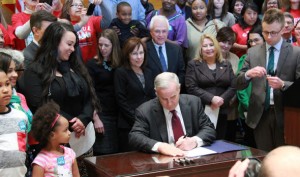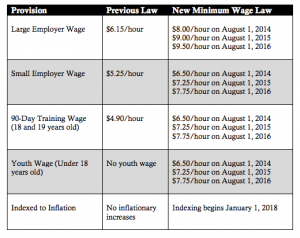Gov. Mark Dayton commemorated his latest legislative victory Monday as he signed Minnesota’s first minimum wage hike bill in more than a decade in front of hundreds of guests at the State Capitol.
Joined in the Capitol Rotunda this afternoon by legislators, advocates, and Minnesotans from across the state, Dayton signed a bill into law raising Minnesota’s minimum wage for the first time since 2005. The bill (HF2091/SF1775), which passed in the House and Senate last week, increases the minimum wage to $9.50 per hour by 2016, and indexes it to inflation to help ensure Minnesotans’ wages keep up with the cost of living.
The law, which will go into effect Aug. 1, will raise the wage $1.85 to $8 per hour on that date, phase in an increase to $9 per hour by Aug. 1, 2015, and then to the full $9.50 per hour by Aug. 1, 2016.

Gov. Mark Dayton signs into law the first, and one of the largest, minimum wage hikes in Minnesota since 2005. (Courtesy of Gov. Mark Dayton office)
“Minnesotans who work full-time should be able to earn enough money to lift their families out of poverty, and through hard work and additional training, achieve the middle-class American Dream,” Dayton said. “Raising the minimum wage to $9.50, and indexing it to inflation, will improve the lives of over 325,000 hard-working Minnesotans. I thank the Legislature for recognizing the need to make work pay in Minnesota.”
Before today, at $6.15 per hour Minnesota had one of the lowest minimum wages in the nation – lower than neighboring Wisconsin, Iowa, North Dakota, and South Dakota. In fact, Minnesota was one of only four states in the country with a minimum wage below the national rate of $7.25 per hour.
But DFL leaders in the Minnesota Legislature set the course to change that last fall, during a so-called “unsession,” after a bill to do so was defeated in the Senate in 2013.
The bill’s lead authors, Rep. Ryan Winkler and Sen. Jeff Hayden, said today’s action will make work pay again in Minnesota, helping hundreds of thousands of Minnesota families get a little closer to fulfilling the promise of the American Dream.
“We believe that all Minnesotans deserve the dignity of supporting themselves and their families through hard work,” Winkler said. “Raising the minimum wage and indexing it to inflation is an important step to create a rising floor for all wages that will benefit hundreds of thousands of Minnesotans who work hard and deserve to get ahead.”
Both Reps. David Fitzsimmons Rep. Bruce Anderson, who represent St. Michael, Albertville, Monticello and Otsego, voted against the house bill. In the Senate, Rep. Mary Kiffmeyer was also against the proposal.All three stated the wage hike was too extreme and would hurt small businesses.
Raising the minimum wage to $9.50 per hour will put an estimated $472 million in additional wages in the pockets of Minnesota’s lowest-wage workers each year. Democrats argued that economists state when minimum wage workers get a raise, they often spend those new wages on basic necessities, goods, and services. That increase in consumer spending is expected to help local businesses in communities across our state, and provide another boost to Minnesota’s growing economy.
How the Law Works – Raising the Minimum Wage
The bill phases-in new increases in the minimum wage over the next several years. To help small businesses, the bill also establishes lower minimum wage requirements for small employers and young workers. The following chart provides more details and a timeline describing how the new law will be implemented over the next several years. Starting in 2018, Minnesota’s minimum wage will be indexed to inflation to help ensure Minnesotans’ wages keep up with the cost of living.
